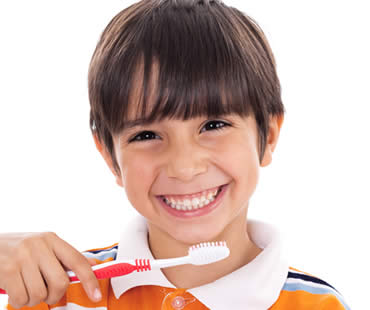
Jan 8, 2021 | Dental Topics 2, Kids Dentistry, Blog
Teaching your kids good dental habits and making sure they get dental care are some of the most important things you can do for them. Guidelines for helping your child improve their oral health depend upon their ages. Here are some oral health tips for various stages of childhood.
Infants (up to 2 years):
It’s never too early to begin oral care! Clean your baby’s gums with a damp cloth after feedings to remove bacteria. Once the first tooth erupts, use a soft toothbrush for babies to gently brush the teeth and gums. Use a pea-sized dab of toothpaste and brush at least twice a day. Around the first birthday, begin taking your child to the dentist for regular checkups.
Preschoolers (2-4 years):
This age group has the highest incidence of tooth decay, because most preschoolers love sugary foods but may not love brushing their teeth. Brush your child’s teeth yourself until they are old enough to do it well, but continue supervising the process to make sure all areas are clean. Consider flavored or character fluoride toothpastes if it encourages your child to brush. Also, limit the amount of sugary foods and drinks your child consumes.
Young elementary (5-7 years):
As more and more teeth grow in, your child needs to brush carefully with fluoride toothpaste. Make sure all areas of your child’s mouth are being reached, and help your child use dental floss to clean between teeth and gums. Continue helping your child make healthy diet choices.
Older kids (over 8 years):
Most children should be able to brush on their own by age 8, but performing spot checks is a good idea to make sure they are doing a good job. Teach your child to brush after meals, especially when eating sugary or sticky foods, and emphasize the importance of flossing every day. Continue taking your child for regular dental checkups every six months, which will help create a life-long habit of good oral care.
We look forward to seeing you in our Conyers dental office

Feb 21, 2020 | Dental Topics 2, Kids Dentistry, Blog
It is vital for parents to understand not to wait until an oral health problem arises to begin dental treatment for their kids. Parents should be aware that in order for children to have the best chance for healthy teeth and gums throughout life, preventive dentistry is one of the keys.
Good oral care should begin when your child is an infant. As soon as babies start drinking milk, sugars can attack the gums even though there aren’t any teeth yet. To avoid damage, clean your child’s gums by gently rubbing them with a damp soft cloth. Around age one, schedule your child’s first appointment with the dentist. The examination will include looking for any issues, teaching home care, and allowing your child to become accustomed to a dentist setting.
As you child grows, dentists and parents can partner together to teach preventive dentistry habits to children. Dentists can show parents the ideal ways to guide children in proper brushing and flossing, and parents can ensure that the methods are carried out consistently at home. You and your dentist may decide together as your child grows whether to opt for dental sealants to help protect your child’s teeth from potential decay and cavities.
Another aspect of good oral health that parents should be involved in is providing nutritious foods for their children. Your dentist can educate your family on the best foods for your teeth and gums, as well as the foods and drinks to avoid. Some items are known to contribute to tooth decay, gum disease, and staining. Teaching your child to make healthy diet choices will promote a healthy mouth.
Preventative dentistry both at home and in your dentist’s office will make your child feel confident about oral care and become comfortable with the dentist. If the time comes for more extensive services, your child will likely trust the dentist and have less apprehension about the dental visit. Good preventive care, however, helps avoid problems and your child will be less likely to encounter major problems requiring painful procedures and lots of time in the dental chair.
Our dental office is located in Conyers

May 17, 2019 | Dental Topics 2, Kids Dentistry, Blog
It’s not uncommon for children to be afraid of going to the dentist. Let’s face it, many adults don’t like visiting the dentist either. However adults mainly don’t want to take the time or don’t want to hear the news that they aren’t taking good care of their teeth. It’s different with kids though, who often have a real fear of the dentist, equipment, and the unknown situation. If your child is one of those who experiences anxiety at the mention of the dentist, here are some things you can do to help ease those fears.
Use visual aids:
It is helpful for some children to watch a video or read a book that will help them become more familiar and comfortable with going to the dentist. Your local library or the internet both likely offer resources for this purpose, and bookstores have books and DVDs for purchase. These visual aids help kids know what to expect in visiting the dentist, and what their role is in the process.
Visit the office:
Take your child to the dentist’s office prior to your appointment so they can observe the office, meet the staff, and see the area and tools used for examinations. The staff may even give your child an explanation of the tools that dentists use for checkups. Your dentist wants children to feel comfortable and confident in getting dental treatment, so most offices do their best to help your child adjust.
Explain the importance:
Even though fear sometimes overtakes logic, it’s still important to explain to your child the reasons for seeing the dentist. Help them understand the benefits of checkups, and the oral health consequences that may occur by not caring for their teeth and getting regular checkups.
Schedule your appointment at our Conyers dental office

Nov 13, 2020 | Dental Topics 2, Kids Dentistry, Blog
Kids will be kids, and emergencies happen that can affect the mouth. To avoid long-term damage, extensive pain, or unsightly results, it’s important to know what to do in a dental emergency. Let’s learn what you should do when your child has one of the following common oral problems.
Severe toothache:
Look for food stuck between the teeth, and if so try to dislodge it with floss. Clean the affected tooth and rinse the mouth well with warm water. Swollen gums may indicate an infection, which requires a dental visit. Facial swelling can be relieved with cold compresses, but if it accompanies severe pain you should take your child to the dentist or emergency room. Try giving over-the-counter pain reliever, but don’t place the medication directly on the gum or tooth.
Chipped tooth:
If your child chips a tooth, contact your dentist immediately. Fast action can help save the tooth, reduce the risk of infection, and prevent extensive procedures. Have your child rinse with cold water. If you can find the tooth fragment, take it to the dentist in case it can be bonded back in place.
Knocked out tooth:
The first thing to do is locate the missing tooth. Hold it by the crown instead of the root, and rinse it gently. Try replacing the tooth back in the socket, and have your child bite a piece of gauze or cloth to hold it in place until you get to the dentist. If you can’t insert it, place it in a cup of cold milk to take with you. Time is important in saving a displaced tooth, so see your child’s dentist immediately.
Cut lip, tongue, or cheek:
Ensure your child’s teeth are undamaged, and apply firm pressure with a moist washcloth or teabag to the bleeding area. If it doesn’t stop in fifteen minutes, call your child’s dentist or head to the emergency room. If the tongue is bleeding, there’s not much you can do except wait to see if it stops bleeding on its own within fifteen minutes. If not, visit the dentist or emergency room.
If you need a dentist in Conyers contact us today

Mar 8, 2019 | Dental Topics 2, Kids Dentistry, Blog
Kids don’t always play it safe or make the best decisions when it comes to protecting their teeth. Tooth decay and mouth injuries are just a couple of things parents must worry about for their kids, whether it’s the elementary school or college years. Here are some simple ways that parents can teach their kids to protect their teeth.
Limit sports and energy drinks.
Sports and energy drinks are both heavily marketed toward today’s youth. It is true that sports drinks help replace electrolytes during exercise, but many people drink them too much or outside the exercise realm. Experts have deemed sports drinks to be unnecessary in the lunchroom or as a snack on the playground. The high acid levels in these drinks can erode tooth enamel, with energy drinks determined to cause twice as much damage. It is recommended to save sports drinks for very strenuous activities, and instead stick with water for hydration and refreshment without the negative effects.
Insist upon mouthguards.
Parents should provide mouthguards for kids in nearly any sport, even if it isn’t considered mandatory by the school or team. Mouthguards can prevent chips, fractures, or knockouts of teeth, as well as protect the soft tissues of the mouth. According to research estimates, 3 million teeth were knocked out in youth sports in 2011. Dentists suggest that athletes who don’t wear mouthguards are 60 times more likely to sustain oral injury. Inexpensive basic mouthguards or the boil-and-bite variety are available at sporting goods stores, or customized mouthguards can be purchased through your dentist.
Say no to oral piercings.
Although it applies primarily to teenagers and older, the Academy of General Dentistry advises against oral piercing for active people. Those with piercings should remove them before participating in sports, because puncture wounds can lead to infections related to increased blood flow and breathing rates during exercise. If your child is considering and oral piercing, make sure you discuss the risks and need for removal during physical activity.
If you need a dentist in Conyers contact us today

Feb 5, 2021 | Dental Topics 2, Kids Dentistry, Blog
Many children aren’t excited about seeing the dentist, either as a result of comments others have made or the idea of an unknown experience. Dental visits are necessary for everyone though, beginning around the child’s first birthday. Here are some basics to know about your child’s dental care.
What happens at the first appointment?:
When your child sees the dentist for the first time, the dentist will look for tooth decay and determine your child’s risk for it. You will be shown how to properly clean your child’s teeth. Also, your dentist will explain the risks of habits that may affect your child’s teeth, such as thumb sucking or sugary drinks.
How often should my child see the dentist?:
You should continue to take your child to visit the dentist every six months, or in some cases more often if your child’s risks are high for tooth decay. Regular checkups can reduce your child’s risk for cavities because plaque will be removed and fluoride will be applied to strengthen the teeth. Also, potential dental issues may be caught early to avoid problems in the future.
What if further treatment is recommended?:
Even though your child might not have permanent teeth yet, dental work may be required on baby teeth too. Cavities can be painful and should be filled. Also, healthy baby teeth help your child properly chew, speak, and develop permanent teeth.
How can I help my child feel more comfortable?:
It is important to help your child’s dentist visits go smoothly so that lifelong habits of regular checkups without fear can be developed. You might consider choosing a pediatric dentist who specializes in children’s oral health and is trained to help kids through the dental visit. Discuss an upcoming dentist appointment with your child, and explain what to expect during the visit. If possible, take your child by the dentist’s office before your first appointment to see what it’s like. During the checkup, remain near your child to increase feelings of security and comfort.
If you need a dentist in Conyers contact us today






